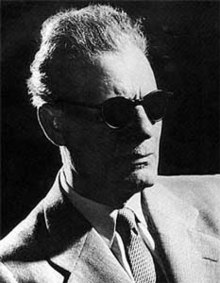
Back طه حسين Arabic طه حسين ARZ Taha Hüseyn Azerbaijani Таха Хусейн Bulgarian তহা হুসাইন Bengali/Bangla Taha Hussein Catalan تەھا حوسێن CKB Taha Husajn Czech Taha Hussein Danish Tāhā Husain German
Taha Hussein | |
|---|---|
طه حُسين | |
 | |
| Born | 14 November 1889[1] |
| Died | 28 October 1973 (aged 83)[1] |
| Era | Modern literary theory |
| School | Modernism, Classical Arabic literature, Nahda |
Main interests | Classical Arabic literature, Islamic history, Mediterranean culture |
Preview warning: Page using Template:Infobox philosopher with unknown parameter "influences"
Preview warning: Page using Template:Infobox philosopher with unknown parameter "influenced"
Taha Hussein (Egyptian Arabic: [ˈtˤɑːhɑ ħ(e)ˈseːn], Arabic: طه حسين; November 15, 1889 – October 28, 1973) was among the most influential 20th-century Egyptian writers and intellectuals, and a leading figure of the Arab Renaissance and the modernist movement in the Arab world.[2] His sobriquet was "The Dean of Arabic Literature" (Arabic: عميد الأدب العربي).[3][4] He was nominated for the Nobel Prize in Literature twenty-one times.[5]
- ^ a b "SCIENCE\taha". Archived from the original on December 10, 2004. Retrieved December 1, 2006.
- ^ Ahmed, Hussam R. (June 15, 2021). The Last Nahdawi: Taha Hussein and Institution Building in Egypt. Stanford University Press. ISBN 978-1-5036-2796-3.
- ^ Ghanayim, M. (1994). "Mahmud Amin al-Alim: Between Politics and Literary Criticism". Poetics Today. 15 (2). Poetics Today, Vol. 15, No. 2: 321–338. doi:10.2307/1773168. JSTOR 1773168.
- ^ طه حسين عميد الأدب العربي: حياته، آثاره الأدبية و آراؤه (in Arabic). 1997.
- ^ "Nomination Archive: Taha Hussein". NobelPrize.org. April 1, 2020. Retrieved September 29, 2022.
© MMXXIII Rich X Search. We shall prevail. All rights reserved. Rich X Search